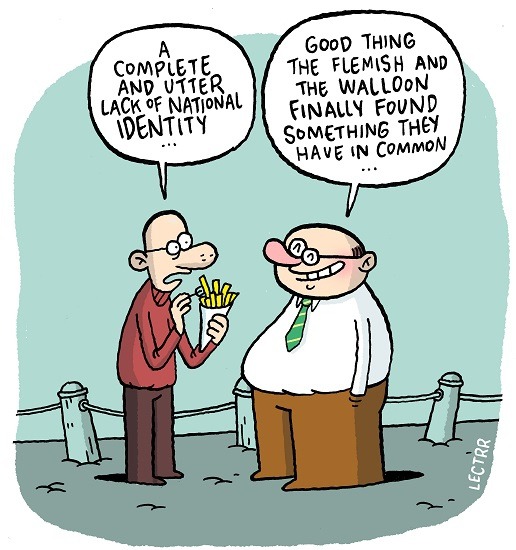It used to be a staple of Belgian politics that the Dutch-speaking Flemish and the French-speakers in Wallonia and Brussels were at permanent loggerheads. Their incessant squabbles defined the national debates, and every political decision would be framed through the lens of a supposedly cracked country. Yet two years from the next Belgian elections, a strange silence has fallen over the country: separatism is almost never talked about in the media or amongst politicians, as if the usual wrangles have been squelched.
Does this mean that the Belgian problem has been solved, or is this rather a false dawn that will be shattered once the 2019 election campaign starts?
Political predictions are tricky in the best of times, and recent events – including last year’s British referendum to leave the EU, and the election of US President Donald Trump – have defied the pundits. But there is a definite calm over Belgium that has gone counter to expectations: the so-called “kamikaze’ coalition” that came into office in 2014 – led by French liberal Charles Michel, including key ministers from the powerful Flemish nationalist New Flemish Alliance party (N-VA) – has surprised many with its stability. Tellingly, the N-VA has seen its Flemish poll ratings fall by 5% since 2014 to around 27%, though they are still by far the biggest party in the country.
“For different reasons, the separatist sentiment has not increased, and may even have fallen,” says Jean Faniel, the chief executive of CRISP, a Brussels-based socio-political research organisation. He says CRISP’s own inquiries into parliament revealed that Flemish socialist, Christian democrat, liberal and green MPs are no longer ready to follow the N-VA in seeking more devolving of powers. “In Belgium, language questions are rarely far away, and we can’t rule anything out, but I don’t think that we are closer to splitting than we were ten years ago, when it seemed to be in the news every day,” he says.
As with much about Belgium, a splodge of context is needed to explain the current mood, taking in the Brussels and Paris bombings, the recent reforms, and the country’s unusual history.
Ever since it declared its independence in 1830, Belgium has been derided by outsiders as an impossible mismatch of two distinct cultures, the Flemish and Walloons, with the city of Brussels in between. Somehow Belgians always found formulae to keep themselves together, but when Flanders began to overtake Wallonia in wealth and power in the 1960s, it spawned increasing Flemish calls for autonomy that have overshadowed politics ever since. The nadir came after the 2010 election, when it took political parties more than 18 months to form a Belgian government, and then only after a major constitutional reform that hived off more powers from the federal authorities to the regions.
But since then, Mr Michel’s government has stayed the course. The terrorist attacks in Paris in November 2015 and Brussels in March last year did little to undermine its authority, even if there were some who sought to use them as another source of discontent. Indeed, after the Islamist plotters of the Paris attacks were traced to the Molenbeek neighbourhood in Brussels, Jan Jambon, the N-VA interior minister in the national government, criticized the “rather lax” policing in Brussels and pointed to Flanders as an example of how to do things properly. His fellow N-VA MP Karl Vanlouwe went further, accusing the francophone socialist party of "Islamo-socialism" and failing to counter radicalism. But such criticisms failed to gain traction.
After retreating from the headlines, Belgium’s split personality re-emerged last October when Wallonia’s regional parliament baulked at CETA, an innocuous EU-Canada trade pact that had been ratified by every other EU member state. It was only after a week of frantic arm-twisting that the deal was pushed through the regional assembly.
For some in Flanders, the CETA debacle re-awakened old stereotypes about grasping Walloons, who were forever undermining their neighbours’ entrepreneurial instincts, with Flemish Minister-President Geert Bourgeois, a leading N-VA figure, warning about the “enormous damage to reputations.” Ironically, this was partly brought on by the Flemish themselves: their demands for autonomy meant shifting competences to the country’s regions, giving Wallonia special veto powers.
Tensions are always simmering, according to Kris Deschouwer, a politics professor at the Brussels Free University (VUB). “If everything is mostly calm on the Belgian front, that is because the major parties have formally agreed not to raise the issue of institutional reform during this term,” he says. “Whether the issue will come back in a way that might once again, like in 2010, be really divisive, is difficult to say.”
Nonetheless, Mr Deschouwer notes that when the Flemish are asked about independence, they have never shown much interest. “If N-VA scored well, it is mainly because of its strong opposition role and its anti-establishment rhetoric,” he says. “While the party’s goal is immediate independence for Flanders, its electorate has never been convinced. The N-VA is popular mainly because of its proposals on immigration and law and order. I would not be too worried about emotional politics, populism or possible divorce in Belgium.”
Sanguine Belgium watchers say that the European countries currently at the greatest risk of a breakup are Spain (with a splinter movement in Catalonia) and Great Britain (with Scotland threatening a new independence referendum). And while there are few certainties in politics, Belgium’s identity crisis seems to have abated, as least for the moment.

